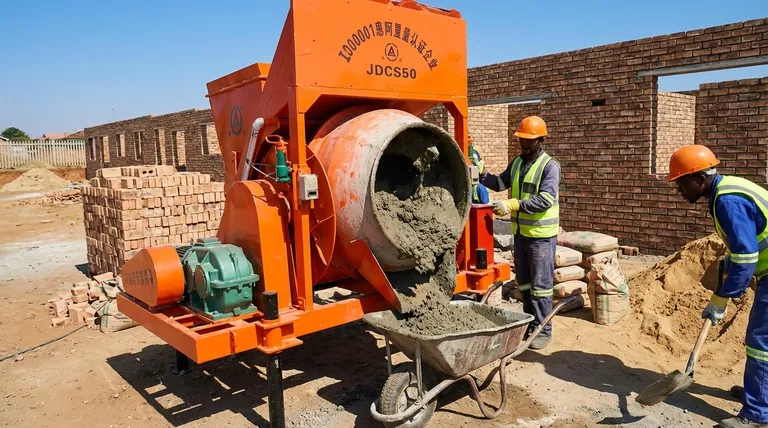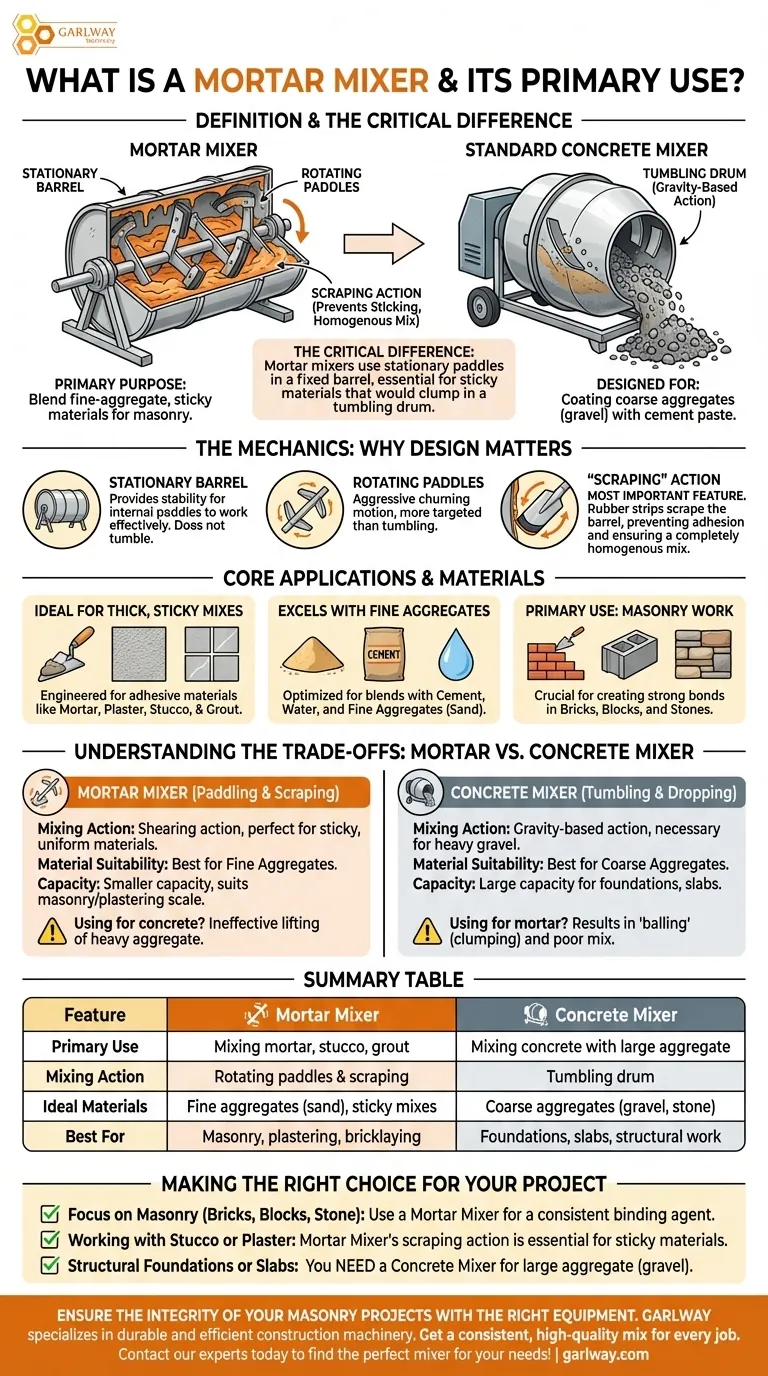A mortar mixer is a specialized construction machine designed to combine fine-aggregate, sticky materials like mortar, stucco, or grout. Its primary purpose is to produce a thoroughly blended, consistent mix for masonry work, such as binding bricks, blocks, and stones together.
The critical difference between a mortar mixer and a standard concrete mixer lies in its design: a mortar mixer uses stationary paddles to churn and scrape material inside a fixed barrel, a method essential for properly blending sticky materials that would otherwise clump and stick to the sides of a tumbling drum.

The Mechanics of a Mortar Mixer: Why Design Matters
The effectiveness of a mortar mixer comes from its unique internal mechanics, which are engineered specifically for the materials it handles.
The Stationary Barrel
Unlike a common concrete mixer that tumbles its contents in a rotating drum, a mortar mixer's barrel remains completely still. This design provides the stability needed for the internal paddles to do their work effectively.
The Rotating Paddles
Inside the stationary barrel, a set of horizontal paddles rotates through the material. This churning action is far more aggressive and targeted than the simple tumbling motion of a concrete mixer.
The "Scraping" Action
This is the most important feature. The paddles are often equipped with a rubber strip that scrapes against the inside of the barrel as they rotate. This action prevents the adhesive mortar from sticking to the sides and ensures all material is continuously folded back into the mix for a completely homogenous result.
Core Applications and Materials
A mortar mixer is not a general-purpose tool; it is a specialist designed for a specific class of materials where consistency is paramount.
Ideal for Thick, Sticky Mixes
It is engineered to handle the thick, adhesive nature of materials like mortar, plaster, stucco, and grout. These materials would perform poorly in a tumbling-style mixer.
Excels with Fine Aggregates
The mixing action is optimized for blends containing cement, water, and fine aggregates like sand. It is not designed to handle the large, coarse aggregates (gravel) found in concrete.
Primary Use: Masonry Work
The most common application is for masonry projects. A consistent mortar mix is crucial for creating strong, durable bonds between bricks, cinder blocks, and stones, ensuring the structural integrity and longevity of the finished wall.
Understanding the Trade-offs: Mortar vs. Concrete Mixer
Choosing the wrong mixer can lead to a poor-quality mix and compromise your project. The two tools are not interchangeable.
Mixing Action Defines the Use
The mortar mixer's paddling and scraping is a shearing action, perfect for sticky, uniform materials. The concrete mixer's tumbling and dropping is a gravity-based action, necessary to coat heavy gravel and stone with cement paste.
Material Suitability is Not Negotiable
Using a concrete mixer for mortar often results in "balling," where the material clumps together and fails to mix properly. Conversely, a mortar mixer lacks the ability to effectively lift and drop the heavy aggregate needed for strong concrete.
Capacity and Scale
Mortar mixers typically have a smaller capacity, suiting the scale of most masonry or plastering jobs. Concrete mixers, especially transit trucks, are designed for delivering the large volumes required for foundations, slabs, and major structural work.
Making the Right Choice for Your Project
Selecting the correct machine is fundamental to the quality of your work. Base your decision on the specific material you need to mix.
- If your primary focus is masonry (bricks, blocks, stone): A mortar mixer is the essential tool for creating a consistent, high-quality binding agent.
- If your primary focus is working with stucco or plaster: The scraping paddle action of a mortar mixer is specifically designed to handle these sticky materials effectively.
- If your primary focus is structural foundations or slabs: You need a concrete mixer, as it is designed to handle the large aggregate (gravel) required for concrete.
Ultimately, choosing the right mixer is the first step toward guaranteeing the integrity and quality of your construction.
Summary Table:
| Feature | Mortar Mixer | Concrete Mixer |
|---|---|---|
| Primary Use | Mixing mortar, stucco, grout | Mixing concrete with large aggregate |
| Mixing Action | Rotating paddles & scraping | Tumbling drum |
| Ideal Materials | Fine aggregates (sand), sticky mixes | Coarse aggregates (gravel, stone) |
| Best For | Masonry, plastering, bricklaying | Foundations, slabs, structural work |
Ensure the integrity of your masonry projects with the right equipment. GARLWAY specializes in durable and efficient construction machinery, including mortar mixers designed for contractors and construction companies. Get a consistent, high-quality mix for every job – Contact our experts today to find the perfect mixer for your needs!
Visual Guide

Related Products
- JDC350 Small Cement Concrete Mortar Mixer
- Auto Concrete Cement Mixer Machine New
- Commercial Construction Mixer Machine for Soil Cement Mixing Concrete
- Portable Concrete Mixer Machine Equipment for Mixing Concrete
- Hydraulic Concrete Mixer Machine Cement Mixing Equipment for Mixture Concrete
People Also Ask
- How does the mixing drum in a cement mixer function? The Key to Perfect, Homogeneous Concrete
- What are the advantages of the simplified operation process in a self loading concrete mixer? Boost Efficiency & Cut Labor Costs
- What is the advantage of a concrete mixer in terms of concrete quality? Ensure Structural Integrity & Durability
- What instruments and tools are needed for the inspection of concrete mixer equipment? Ensure Safety and Performance
- Why are silent cement mixers beneficial for urban construction sites? Solve Noise & Space Challenges
- How do the helical blades inside mixing drums function? Master the Lift-and-Tumble Mixing Action
- Why is the loading period important in concrete mixing? Master the Chemistry for Stronger Concrete
- What makes continuous mixers suitable for remote locations? Gain On-Site Concrete Production Independence



















